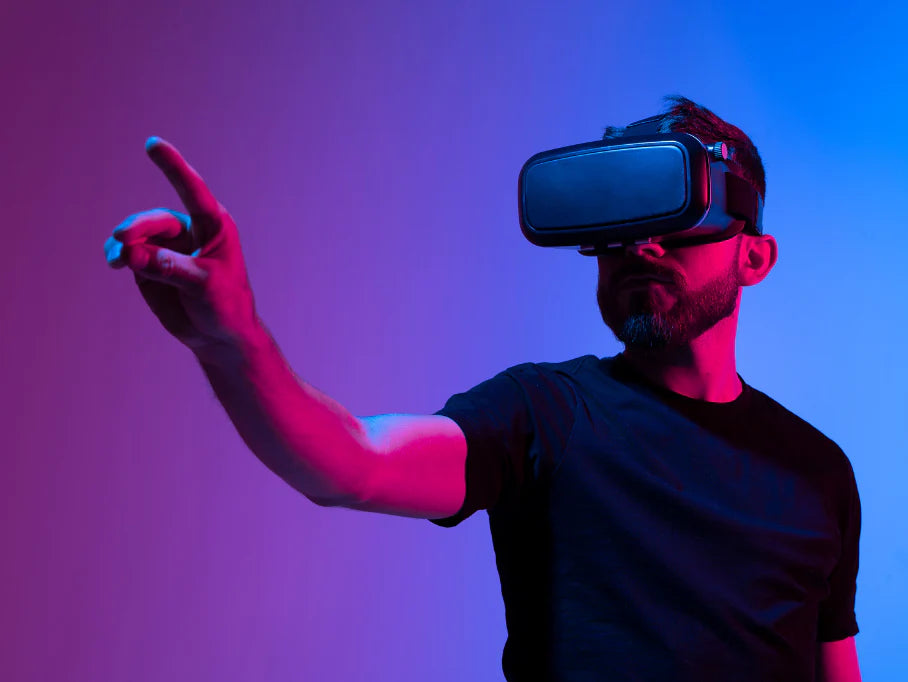
The Metaverse: A Deep Dive into Virtual Reality's Next Frontier
Share
In the ever-evolving landscape of technology, the concept of the metaverse has emerged as a tantalizing vision of the future—a digital realm that goes beyond our current understanding of the internet and virtual reality. This blog post delves into the metaverse, exploring its current state, potential applications, and the profound implications it holds for society.
Understanding the Metaverse
The term "metaverse" originated from science fiction and was popularized by Neal Stephenson's 1992 novel "Snow Crash." In its essence, the metaverse is a collective virtual shared space that is created by the convergence of physical and virtual reality. It is not merely a three-dimensional internet but a fully immersive digital universe where users can interact with each other and the environment in real-time.
At its core, the metaverse is a manifestation of the evolution of the internet. It represents a shift from the current web, where information is primarily accessed through screens, to a spatial computing paradigm that blends seamlessly with our physical reality. In the metaverse, users navigate through digital spaces using avatars, and the boundaries between the physical and virtual worlds become increasingly blurred.
Current State of the Metaverse
While the concept of the metaverse has been around for decades, recent advancements in technology have brought it closer to reality. Virtual reality (VR), augmented reality (AR), and mixed reality (MR) technologies have made significant strides, enabling more immersive and interactive digital experiences.
Several platforms are already positioning themselves as early players in the metaverse space. Social VR platforms like Facebook Horizon and VRChat allow users to create personalized avatars, interact with others, and explore virtual spaces. Gaming environments, such as Fortnite and Minecraft, are also evolving into metaverse-like experiences, with expansive digital landscapes and social interactions.
However, the current state of the metaverse is fragmented, with different platforms existing independently. Interoperability and standardization are key challenges that need to be addressed for the metaverse to reach its full potential as a seamless and interconnected digital universe.
Potential Applications of the Metaverse
The metaverse holds immense potential across various sectors, from entertainment and education to business and healthcare.
-
Entertainment: The entertainment industry is already exploring the metaverse with interactive concerts, virtual theaters, and immersive gaming experiences. As the metaverse develops, we can expect new forms of storytelling, interactive narratives, and collaborative creativity to flourish.
-
Education: Imagine students attending virtual classes in historical settings or conducting scientific experiments in a simulated laboratory. The metaverse has the potential to revolutionize education by providing immersive and engaging learning experiences that transcend the limitations of traditional classrooms.
-
Business: Virtual meetings and collaborative workspaces are just the tip of the iceberg. In the metaverse, professionals could attend conferences, network with colleagues, and collaborate on projects in a spatial environment, enhancing productivity and fostering global collaboration.
-
Healthcare: The metaverse could play a crucial role in healthcare by enabling remote consultations, medical training in virtual environments, and therapeutic interventions. Patients could benefit from virtual support groups and immersive experiences that aid in mental health treatment.
Implications for Society
While the metaverse promises exciting possibilities, its widespread adoption also raises significant societal, ethical, and privacy concerns.
-
Digital Inclusion: The metaverse could exacerbate existing digital divides, with access limited to those who can afford the necessary technology. Ensuring equitable access to the metaverse is crucial to prevent the creation of a new form of digital inequality.
-
Privacy and Security: As users immerse themselves in the metaverse, concerns about data privacy and security become paramount. The collection and use of personal data within virtual environments must be carefully regulated to protect users from potential exploitation.
-
Identity and Authenticity: In a world where avatars represent users in the metaverse, questions of identity and authenticity arise. Issues such as identity theft, virtual property ownership, and the potential for malicious activities must be addressed to create a safe and trustworthy digital space.
-
Ethical Considerations: The metaverse introduces new ethical dilemmas, including the potential for addiction, the blurring of reality and virtual experiences, and the impact on mental health. Society must grapple with these ethical considerations as the metaverse becomes an integral part of our lives.
The metaverse represents a paradigm shift in how we perceive and interact with digital information. As technology continues to advance, the boundaries between the physical and virtual worlds will become increasingly blurred, ushering in a new era of immersive experiences and digital collaboration. While the potential applications are vast and exciting, it is imperative to navigate the challenges responsibly to ensure that the metaverse becomes a force for positive transformation in society. The journey into the metaverse has only just begun, and the coming years will undoubtedly witness the unfolding of a new digital frontier.
